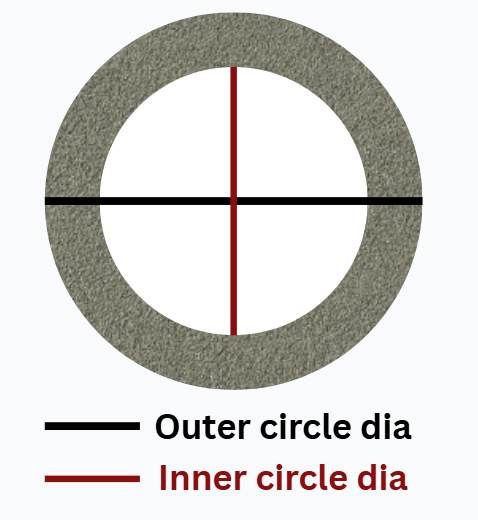Circular Gravel Calculator
Estimate how much gravel you need for circular areas and ring-shaped layouts.
Gravel Calculator for Circular Area – Patios, Firepits, Round Paths
Calculation is based on average density of 1600 kg/m³.
Calculation Results
Gravel Volume
0.00 m³
Gravel Weight
0.00 t

Gravel Calculator for Ring shapes – Annular Path Volume Estimator
Calculation is based on average density of 1600 kg/m³.
Calculation Results
Gravel Volume
0.00 m³
Gravel Weight
0.00 t


How the Circular Gravel Calculator Works
The calculator works using a basic geometric formula for the area of a circle: π × radius² × depth. You only need to enter the diameter or radius of your circular zone, along with how deep you plan to lay the gravel. The calculator takes care of the rest.
If you're working with an annular ring, like a circular driveway or a round garden bed with an empty center, the tool will subtract the inner circle’s area from the outer circle’s area automatically. That gives you an accurate estimate of the gravel volume needed around the edge.
Once the volume is known, the calculator multiplies it by the density of the gravel (usually measured in kg/m³ or lbs/ft³) to estimate total weight. This is useful if you're ordering gravel by the ton, yard, or bag.
Circular Gravel Projects: Where You Should Use This Calculator
This calculator is super-helpful for:
Circular Firepit Zones
Firepits often sit in the middle of a perfectly round area. Gravel around firepits helps with drainage and keeps the space safe from flying embers. For walkable surfaces like this, a gravel depth of about 2 to 3 inches is ideal. This calculator helps you figure out exactly how much you’ll need based on the size of your circle.
Round Patios or Courtyards
Circular patios are a popular design feature in gardens, especially when paired with pavers or stone edging. Gravel fills the gaps and prevents weed growth while enhancing the overall look. The calculator estimates volume whether you’re filling the entire space or surrounding a central feature.
Circular Driveways or Roundabouts
Driveways that loop around a garden or feature often have a ring layout, which is why the annular calculator is helpful here. These areas require more depth, typically 4 to 6 inches, to handle car weight. Use the ring calculator if your layout includes a hollow center.
Ring Gardens & Borders
If your design includes circular flower beds or outer stone borders, this tool can calculate the gravel needed to create a neat ring around the center.
What Gravel Depth Should You Use?
- Walkable paths or patios: 2 to 3 inches of gravel works well
- Driveways or areas with vehicle traffic: Aim for 4 to 6 inches for strength
- Decorative gravel beds or accents: 1 to 2 inches is usually enough
Gravel tends to settle over time, especially if compacted or exposed to heavy rain. It’s a good idea to add 5–10% extra to your estimate to cover compaction or unexpected dips in the ground.
What if My Circular Area Has an Irregular Edge?
Try measuring the average diameter across the widest and narrowest parts. Use that as your input. For odd shapes, estimate in sections or break it into circles and rectangles.
How Do I Know Which Gravel to Buy?
It depends on function and style. Pea gravel is good for comfort and walking areas, while crushed rock provides more grip and compacts better for driveways.
Final Tips Before Buying Gravel
- Double-check your measurements. Small changes in radius can lead to big differences in volume.
- Use spray paint or rope to mark out your circular area in the yard. This helps visualize the space and ensures you measure accurately.
- Always order a bit extra. Gravel settles, spills, and may need topping up. Better to have leftovers than run short mid-project.